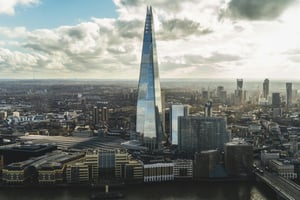Noise pollution is something many Londoners either put up with or simply accept as an unavoidable...
How could the Paris Olympics legacy compare to London 2012?

The Paris Olympics got off to a drizzly start last week, with thousands of athletes descending on the city’s river for the unique opening ceremony. Despite the poor weather, organisers will have breathed a sigh of relief after years of meticulous planning – which, just like with London 2012, came with its fair share of public backlash.
But what lessons may have been learnt since London 2012? And how can the city ensure its citizens continue to reap the benefits of the games for years to come?
Here, we look at comparisons between the two major sporting events.
London 2012
The London games were heralded before and after for their potential to deliver a glorious legacy, which would outlast the event itself. This was especially exciting given the main Olympic Park was built in a poverty-stricken corner of the city, regenerating it in the process.
This didn’t mean its organisation went without hiccups. As many as one thousand people faced eviction during the build process – and property prices skyrocketed in a way that many local residents could no longer afford, contributing to accelerated gentrification.
Pledges to build as many as 40,000 new homes surrounding the Olympic Park were not delivered on satisfactorily, with less than 1,200 built within the first 10 years after the games concluded.
Such problems highlight the importance of having a clear and strategic communications plan in place that both stress the benefits of a project of this scale, alongside meaningful displays of intent to carry out the pledges made. Empty promises have the capacity to lead to stakeholder apathy or cynicism in relation to future projects.
It is not all negative though however – with the games indeed delivering real benefits to local people. From lasting new community sports spaces, thousands of new jobs, new schools and the redevelopment of brownfield land, the Stratford and Newham areas of London have changed significantly.
Paris 2024
While it is very much early days, considering the Paris games are continuing – one lesson which appears to have not been learnt from London comes to the construction of the city’s three Olympic Villages and the impacts they have on local people.
Again, construction has had a significant impact on poorer parts of the city. Allegations of “social cleansing” have been slung at French authorities over the evictions of hundreds of homeless people from squats, many of whom have been put up in temporary accommodation across France.
Such evictions are not necessarily the fault of the Olympics, but raise questions over how best to handle the most sensitive areas of planning for such a huge event – especially when the world’s eyes are attentively directed towards you.
But, like with London, there are undoubtedly benefits of the games which, as it stands, appear will have a lasting impact on the city and its people.
This has been especially true with the cleaning of the Seine – while commitments have been made to repurpose apartment blocks used for athletes into lasting housing for local people. There has also been positives on the sustainability front with the widespread use of solar panels to encourage the use of renewable energy for both athletes and future generations alike.
What can we learn from Olympic planning?
There is no denying that hosting the Olympic games brings a myriad of benefits and drawbacks for our cities. While the initial excitement and promise of lasting improvements are quick to inspire, it is important not to overlook the way in which changes are delivered and both the short and long-term impacts they may have.
Time will tell if London’s Olympic legacy will continue – and the same goes for Paris in these very early days.
What both cases together show us undoubtedly is the importance of sound planning and clear and well-structured communication plans.
If you are in the process of planning a major event and are in need of logistical support or consultancy, contact the team today to learn how Urban Thinking can help.


.png?height=200&name=C%20(2).png)
